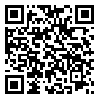Volume 9, Issue 6 (3-2017)
IJMEHM 2017, 9(6): 5-19 |
Back to browse issues page
Download citation:
BibTeX | RIS | EndNote | Medlars | ProCite | Reference Manager | RefWorks
Send citation to:



BibTeX | RIS | EndNote | Medlars | ProCite | Reference Manager | RefWorks
Send citation to:
Mohammadi M, Dayani Tilaki M S, Larijani B. Patients' attitudes about privacy and confidentiality in selected hospitals in Tehran. IJMEHM 2017; 9 (6) :5-19
URL: http://ijme.tums.ac.ir/article-1-5887-en.html
URL: http://ijme.tums.ac.ir/article-1-5887-en.html
1- PhD Candidate
2- Department of Islamic Teachings, Mashhad University of Medical Sciences , Mashhad, Iran
3- Medical Ethics and History of Medicine Research Center, Tehran University of Medical Sciences, Tehran, Iran. ,emrc@tums.ac.ir
2- Department of Islamic Teachings, Mashhad University of Medical Sciences , Mashhad, Iran
3- Medical Ethics and History of Medicine Research Center, Tehran University of Medical Sciences, Tehran, Iran. ,
Abstract: (8786 Views)
Privacy and confidentiality are the inalienable rights of every human being to preserve his dignity. This issue should be considered in all levels of medical interventions. In the healthcare system, based on respect for privacy and confidentiality, patients decides what information to provide to their physicians. However, if a patient does not provide necessary information to his physician this may impact the diagnosis and treatment. This study aims to evaluate patients’ attitude regarding privacy and confidentiality in healthcare delivery. The result helps policy makers to establish appropriate relations between healthcare providers and patients by realizing its strengths and weaknesses.
This cross-sectional study was carried out on 200 patients, selected in a systematically random way, in Imam Khomeini and Shariati hospitals in Tehran the capital of Iran in 2010. The data were collected directly from patients by trained interviewers based on a questionnaire survey. In order to analyze the data based on the scores of the attitude, patients’ attitudes were classified into three groups of negative, slightly positive, and positive and were evaluated by using various statistical tests.
In result, 56.5% (113) of participants were females and 43.5% (87) were male. In this study, it was found 71 (35.5%) patients were “strongly agree” that male physician can examine female patients and 99 (49.5%) patients were “agree”. Fifty three patients were “strongly agree” that physician may consult with his assistant through training (without the patient's permission) and 103 patients were “agree”. Participants’ attitude about disclosing the patient’s information if a he has threaten self-harm or harm to another person was as follow, 45 (22.5%) patients were “strongly agree”, 82 (41.0%) patients were “agree” and 56 (28.0%) patients had “no comment”. In this study, in general 36 (18.0%) patients had “negative”, 162 (81.0%) patients “slightly positive”, and 2 (1.0%) patients had “positive attitude” towards privacy and confidentiality in healthcare settings.
In conclusion, the study population possessed a moderate attitude towards privacy and confidentiality. These results show that in addition to performing further studies, patients’ attitude towards privacy and confidentiality should be adequately improved.
This cross-sectional study was carried out on 200 patients, selected in a systematically random way, in Imam Khomeini and Shariati hospitals in Tehran the capital of Iran in 2010. The data were collected directly from patients by trained interviewers based on a questionnaire survey. In order to analyze the data based on the scores of the attitude, patients’ attitudes were classified into three groups of negative, slightly positive, and positive and were evaluated by using various statistical tests.
In result, 56.5% (113) of participants were females and 43.5% (87) were male. In this study, it was found 71 (35.5%) patients were “strongly agree” that male physician can examine female patients and 99 (49.5%) patients were “agree”. Fifty three patients were “strongly agree” that physician may consult with his assistant through training (without the patient's permission) and 103 patients were “agree”. Participants’ attitude about disclosing the patient’s information if a he has threaten self-harm or harm to another person was as follow, 45 (22.5%) patients were “strongly agree”, 82 (41.0%) patients were “agree” and 56 (28.0%) patients had “no comment”. In this study, in general 36 (18.0%) patients had “negative”, 162 (81.0%) patients “slightly positive”, and 2 (1.0%) patients had “positive attitude” towards privacy and confidentiality in healthcare settings.
In conclusion, the study population possessed a moderate attitude towards privacy and confidentiality. These results show that in addition to performing further studies, patients’ attitude towards privacy and confidentiality should be adequately improved.
Type of Study: Research |
Subject:
Medical Ethics
Received: 2017/04/18 | Accepted: 2017/08/16 | Published: 2017/08/16
Received: 2017/04/18 | Accepted: 2017/08/16 | Published: 2017/08/16
Send email to the article author
| Rights and permissions | |
 |
This work is licensed under a Creative Commons Attribution-NonCommercial 4.0 International License. |





